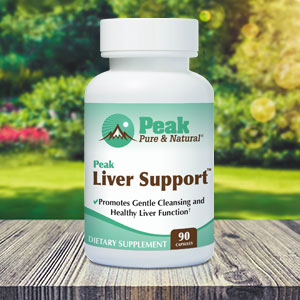Get Easy Health Digest™ in your inbox and don’t miss a thing when you subscribe today. Plus, get the free bonus report, Mother Nature’s Tips, Tricks and Remedies for Cholesterol, Blood Pressure & Blood Sugar as my way of saying welcome to the community!
The weird heart-liver-calorie connection you should know about

You may have read a lot lately about the life-lengthening benefits of a calorie-restricted diet, or even fasting.
The opposite, excessive calorie consumption, leads to metabolic changes in your body that can lead to heart disease.
But when you control your cravings and eating behaviors to restrict your caloric intake, inflammation in your body is controlled, cell survival is extended, your stress defense is improved, and your cellular activity functions optimally.
Heart disease has always been a fact of life in my family, so tips like this that I’ve learned along the way, have become a regular part of my life.
But I didn’t know that, in trying to outlive a family curse for heart problems, I was also protecting my liver — something I learned when my Uncle Rob had a heart attack…
Even though his heart recovered and gained strength quickly, his liver was left scarred and unable to function properly.
That’s when I discovered how incredibly connected our hearts and our livers actually are.
And, like what happened to my uncle, if you suffer from a heart attack, you could easily end up with liver damage. Or, if you have liver problems, like fatty liver disease, it can cause damage to your heart.
That’s why protecting your liver is so vital… And, according to a new study, one of the best ways to protect your liver is to eat a low-calorie diet.
Here’s why…
Caloric restriction, calcium and liver death
In a study at University of São Paulo (USP) in Brazil, researchers showed that a Calorie-Restricted (CR) diet protected the liver from damage due to temporary interruption of blood flow to the organ due to a heart attack.
The scientists allowed one group of mice to eat as much as they wanted, while another group was restricted to a diet of 40 percent less calories.
They then experimented, interrupting approximately 70 percent of the blood flow to the livers of the mice in both groups for 40 minutes, simulating a heart attack. This was done to increase tissue calcium, to cause a breakdown in the function of mitochondria (organelles that produce energy for cells), which leads to the death of some liver cells.
When they compared the mice that ate all they wanted with the mice fed a CR diet, they found a huge difference. Approximately 25% of the liver was damaged in the former group, and only 1% was damaged in the latter.
In other words, eating a calorie-restricted diet protected the livers of the mice in the event of a heart attack.
The scientists say this protection was provided by the fact that the CR mouse mitochondria were able to absorb approximately 70 percent more calcium than the mitochondria of the control mice without functional impairment — so the calcium was not able to set off the chain of events that lead to liver cell death.
Caloric-restriction 101
To put a calorie-restricted diet to work to protect your liver, you’ll want to reduce your caloric intake by 30 – 40 percent without sacrificing the vitamins and nutrients you need to stay healthy. This is about what the mice on the restricted diet followed, but it was in comparison to the mice that were allowed to eat to their hearts content.
So if you normally eat a rather high-calorie diet, then you could probably cut 30-40 percent of your calories easily. But if you follow a reasonable diet, you may only want to consider decreasing by 20-30 percent. It’s important to determine how many calories you consume in a day before you start reducing your intake.
And the number one rule is to choose nutrient-dense food over calorie-dense food. For example, an ice cream shake is calorie-dense but nutrient-poor whereas a cup of broccoli is nutrient-dense but low in calories. The key is to make healthy choices.
Some good guidelines to follow are:
- Eat plenty of vegetables, especially green vegetables like kale, spinach and broccoli.
- Avoid sugars and flours whenever possible.
- Eat high-quality proteins daily.
- Choose good fats like avocadoes, coconut oil and extra virgin olive oil.
- Start slowly, and only remove 10 percent per week to allow your body to adjust.
You can also take supplements that promote liver health. These include the amino acid N-Acetyl Cysteine (NAC) and milk thistle
But if you are ready to accept the calorie restriction challenge, it appears to hold many health benefits, in addition to heart and liver health.
The health of your heart and your liver are connected. Don’t let a heart attack leave you with a damaged liver or let liver problems affect your heart. Protect yourself by using a calorie-restricted diet and supplements that support optimal liver detoxification.
Editor’s note: There are perfectly safe and natural ways to decrease your risk of blood clots including the 25-cent vitamin, the nutrient that acts as a natural blood thinner and the powerful herb that helps clear plaque. To discover these and other secrets of long-lived hearts, click here for Hushed Up Natural Heart Cures and Common Misconceptions of Popular Heart Treatments!
Sources:
- Less fat, more hair and younger skin: Study in mice shows benefits from calorie-restricted diet — Fundação de Amparo à Pesquisa do Estado de São Paulo














